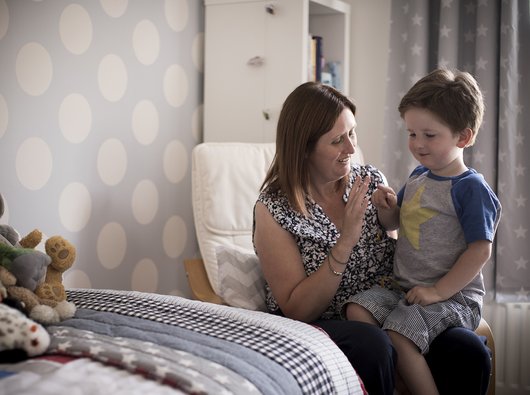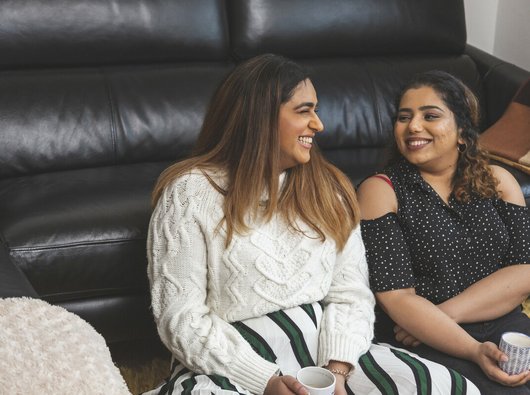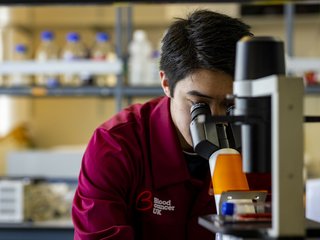Childhood acute myeloid leukaemia (AML) treatment
The aim of treatment for childhood AML is to get rid of the leukaemia cells and help your child’s bone marrow to work normally again.
Treatment planning
The main treatment for childhood AML is chemotherapy (treatment with anti-cancer drugs). These are normally given intravenously through a central line We have more information about managing your child's treatment and how chemotherapy is given (central lines).
The particular treatment will depend on your child’s individual condition and general health. Doctors will explain the treatment they recommend, and you will be able to ask questions and make choices as the parent or carer of a child under 16, or for yourself if you are 16 and over.
AML can develop rapidly, so it’s vital to have effective treatment soon after the diagnosis has been confirmed.
Risk groups
Doctors will use information from tests to assess your child’s level of risk. Risk is the chance of something happening – in this case, it’s the chance that the AML will be more difficult to treat or come back (relapse) after treatment.
For childhood AML, there are three risk groups:
- standard risk
- intermediate risk
- high risk.
The risk group may change, depending on how well treatment is working. Risk grouping is just a way of deciding which treatment is best at a particular point. A child or young adult with high risk AML may respond just as well to treatment as someone with intermediate or standard risk AML – it’s about choosing the best treatment for each person’s leukaemia.
Pre-treatment
Some children and young adults are very unwell when they are first diagnosed with AML. Doctors may need to get them better so they can cope with the drugs used to treat AML. They may have:
- infections, because they have a low number of normal white blood cells
- anaemia – paleness, tiredness and breathlessness – because of low numbers of red blood cells
- bleeding, because they don’t have enough platelets and other substances needed for blood clotting
- breathing, heart or kidney problems because of the presence of leukaemia cells.
Read more about the symptoms of childhood AML.
Your child may be given antibiotics and blood or platelet transfusions to help with these problems before they start chemotherapy. Some children may be supported best in an intensive care unit (ICU).
Stages of treatment
Induction
This first stage of treatment is called induction. Your child will have two courses of chemotherapy – usually a combination of two or more drugs – as their induction treatment. The aim is to get them into remission, where there are few or no leukaemia cells visible in the bone marrow. Most children and young adults go into remission after induction treatment.
These are the most likely drug combinations for induction treatment.
- mitoxantrone, cytarabine and gemtuzumab ozogamicin (Mylotarg®).
- fludarabine, cytarabine and idarubicin (FLA-Ida).
Consolidation
The next stage of treatment is called consolidation. This aims to kill any leukaemia cells that are left after induction treatment and stop the AML coming back (relapsing).
For children and young adults with standard and intermediate risk AML, consolidation is normally two more courses of chemotherapy. This might involve:
- two courses of high dose cytarabine
- two courses of fludarabine with cytarabine
Doctors will do more tests after each course of chemotherapy to see how successful the treatment has been. Based on the results, your child’s level of risk may change, and this will help doctors recommend the next course of treatment.
Children and young adults with high risk AML will be offered a stem cell transplant (see below).
If your child is being treated as part of a clinical trial, then they may receive other drug combinations at the induction and consolidation stages. We have more information about clinical trials for childhood AML.
Treating AML in the cerebrospinal fluid
Sometimes, leukaemia cells can be found in the fluid (known as cerebrospinal fluid or CSF) that surrounds the brain and spinal cord.
Even if a lumbar puncture test shows no leukaemia cells in the CSF, children and young adults will have a chemotherapy drug called cytarabine injected into their spine to make sure the leukaemia doesn’t spread to the CSF. This procedure is called an intrathecal injection.
Your child will have these injections with their first two rounds of chemotherapy. They may need more if leukaemia cells are seen in the CSF.
Stem cell transplants
If test results show that your child has a high risk of relapse (the AML coming back), they will be offered a donor stem cell transplant as their consolidation treatment. This means receiving blood stem cells from another healthy individual (a donor).
We have more information about stem cell transplants, including our free booklet, Blood stem cell and bone marrow transplants: the 7 steps
Clinical trials
Many children in the UK who are diagnosed with cancer are treated through a clinical trial, where treatment options are compared to see which brings the best results.
Because cancer is so rare in children, clinical trials are really important for testing new treatments and improving current ones. Through trials, more children are cured and long-term side effects are reduced.
If there’s a clinical trial available that’s suitable for your child, your doctor may ask you, (or your child, if they’re over 15), to consider taking part.
In a trial, your child’s safety and wellbeing are always the priority. They’ll be closely checked during and after the trial – and can withdraw at any time.
The latest national clinical trial for childhood AML is called MyeChild01. It is still running but is not accepting any new participants. The trial has several aims, including:
- to explore the effect of adding gemtuzumab ozogamicin (Mylotarg®) to induction therapy, and decide the best dosage
- to compare two types of conditioning (preparation) for a stem cell transplant
- to understand more about how measurable (or minimal) residual disease (MRD) can guide treatment decisions. MRD means the number of leukaemia cells left in the body after a course of treatment – it can be tiny but still affect remission.
Taking part in a trial does come with uncertainties and risks. There’s also no guarantee the treatment being tested will be better than the standard recommended treatment.
If you don’t want your child to be in a trial, or there isn’t a suitable trial running, that's OK. Your child will be offered the best treatment available that’s right for them, based on their test results and general health.
Your child’s hospital team can give you more information about clinical trials for childhood AML.
Find out more about clinical trials.
Hugo's treatment for leukaemia
"I know that one of the projects Blood Cancer UK fund ensured that Hugo didn’t have to endure any more chemotherapy than absolutely necessary. I’m so grateful for that. "
Read Lisa's story about Hugo's treatment and recovery

Treatment side effects
Side effects are the unwanted effects of treatment. There are some potential short-term and long-term side effects from treatment for childhood AML.
It’s important to understand that all children are different and that although the list of potential side effects may be worrying, they’re unlikely to get all of them.
Your hospital team will also have effective treatments to help your child cope with side effects. This is known as supportive care.
We have general information on side effects of treatment for childhood leukaemia, and supportive care to help with them.
Information for young adults
Young adults with blood cancer share tips and advice on side effects, friendships, work, study and lots more.

How long does treatment take?
Generally for standard or intermediate risk AML, there are 4 courses of chemotherapy. The chemotherapy is given over 5-10 days (depending on the particular treatment), but including recovery, each course takes 4 to 6 weeks.
If your child has standard or intermediate risk AML, treatment will take 5 to 6 months in total. If your child has high risk AML, treatment may take longer.
Will my child have to stay in hospital?
Your child may be able to go home for a few days in between each course of chemotherapy, but they will probably need to stay in hospital most of the time during treatment.
This is because the chemotherapy drugs are very strong and your child will need supportive care such as blood and platelet transfusions and urgent treatment for infections.
After treatment
When your child’s treatment has finished, they will continue to come to the hospital for regular check-ups. As time passes after treatment, these appointments will be needed less often.
Remission and relapse
After treatment, most children will go into remission, where there is no sign of leukaemia. But the leukaemia may come back (relapse). If this happens, they will have similar tests to when they were originally diagnosed.
Treatment options will include a stem cell transplant, if they haven’t already had one. Children who relapse a long time after their treatment has finished have a better chance of responding well to more treatment.
Tests like MRD and genetics help to show which children are at higher risk of relapse, so they can have stronger treatment at the beginning. The aim of stronger treatment is to stop relapse happening.

Our research into childhood leukaemia
Childhood leukaemia has always been a focus for our research and is where we have some of our biggest breakthroughs.
